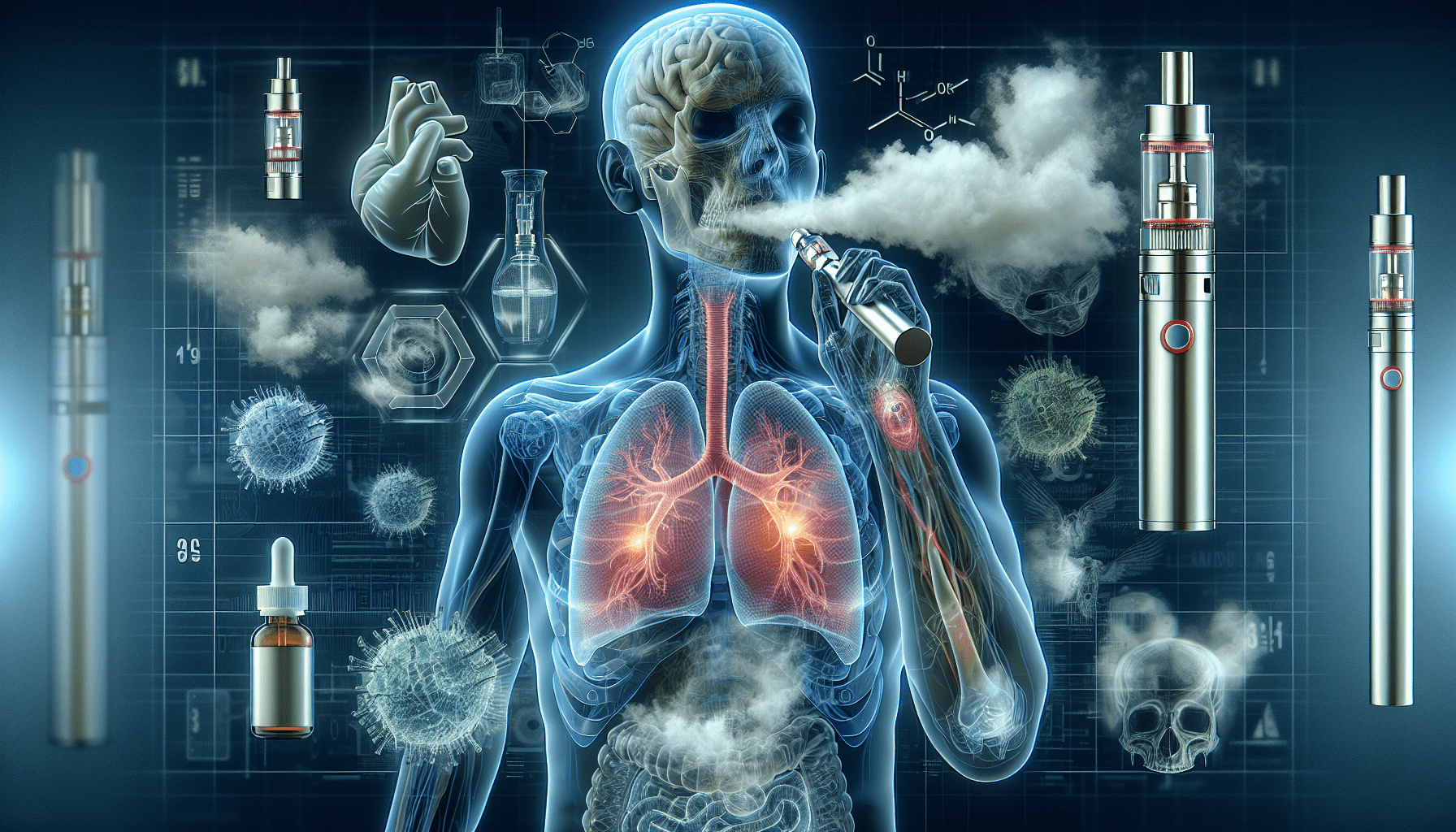Are you aware of the potential health problems caused by vaping? In recent years, vaping has grown increasingly popular as an alternative to traditional smoking. However, the rise in popularity has brought about concerns regarding the impact it may have on our well-being. In this article, we will explore the various health problems associated with vaping and shed light on the potential risks involved. From respiratory issues to cardiovascular complications, it is important to be well-informed about the potential consequences of this popular trend.

Respiratory Issues
Vaping, while often considered a safer alternative to traditional smoking, is not without its own set of health risks. One significant area of concern is the impact vaping can have on the respiratory system.
Lung Damage
One of the most serious respiratory issues associated with vaping is lung damage. The inhalation of certain chemicals and substances found in e-cigarettes can lead to inflammation and damage to the delicate tissues of the lungs. This damage can impair lung function and increase the risk of developing respiratory conditions.
Respiratory Infections
Vaping has also been linked to an increased risk of respiratory infections. The act of inhaling aerosols containing numerous harmful compounds can compromise the immune system, making individuals more susceptible to bacterial and viral infections such as pneumonia and bronchitis. These infections can be particularly concerning for individuals with already weakened respiratory systems.
Asthma Exacerbation
For those who already have asthma, vaping can worsen symptoms and increase the frequency and severity of asthma attacks. The chemicals present in e-cigarettes can irritate the airways and trigger inflammation, leading to constricted air passages and difficulty breathing. It is crucial for individuals with asthma to avoid vaping to prevent potentially serious complications.
Chronic Bronchitis
Vaping has also been associated with the development of chronic bronchitis, a condition characterized by persistent inflammation and irritation of the bronchial tubes. The inhalation of harmful chemicals from e-cigarettes can lead to chronic bronchitis, causing symptoms such as a persistent cough, excessive mucus production, and shortness of breath. Long-term exposure to these irritants can result in irreversible damage to the respiratory system.
Cardiovascular Problems
In addition to respiratory issues, vaping can also have adverse effects on cardiovascular health.
Increased Heart Rate
Vaping has been shown to increase heart rate, which can put unnecessary strain on the cardiovascular system. The nicotine present in e-cigarettes stimulates the release of adrenaline, leading to an elevated heart rate. Prolonged exposure to increased heart rate can potentially lead to heart rhythm abnormalities and other cardiovascular complications.
High Blood Pressure
Nicotine, a highly addictive substance found in e-cigarettes, can also cause an increase in blood pressure. This sudden elevation in blood pressure can persist even after the immediate effects of vaping have worn off, placing additional stress on the heart and blood vessels. Over time, this can contribute to the development of hypertension, a risk factor for heart disease and stroke.
Elevated Heart Attack Risk
Vaping has been linked to an increased risk of heart attack. The chemicals present in e-cigarettes can damage blood vessels, leading to the formation of plaques and the narrowing of arteries. This, coupled with the increased heart rate and elevated blood pressure experienced during vaping, can significantly raise the risk of experiencing a heart attack, especially in individuals with preexisting cardiovascular conditions.
Arterial Stiffness
Arterial stiffness, a condition where blood vessels lose their elasticity and become less able to expand and contract, has been associated with vaping. This can result in higher blood pressure levels and reduced blood flow to vital organs. Arterial stiffness is a significant risk factor for heart disease and stroke and can lead to long-term complications if left unaddressed.
Nicotine Addiction
Nicotine addiction is a major concern associated with vaping, as it can lead to dependence and a range of health issues.
Development of Dependence
Vaping exposes individuals to high levels of nicotine, a highly addictive substance. With repeated use, the brain becomes dependent on nicotine to function normally, leading to cravings and withdrawal symptoms when attempting to quit. The addictive nature of nicotine can make it challenging for individuals to stop vaping, perpetuating the cycle of addiction.
Withdrawal Symptoms
When attempting to quit vaping, individuals may experience a variety of withdrawal symptoms. These symptoms can include irritability, anxiety, difficulty concentrating, headaches, and intense cravings for nicotine. Withdrawal symptoms can make it challenging for individuals to quit vaping and can contribute to relapse and continued use.
Nicotine Toxicity
Excessive nicotine intake, often facilitated by the use of high-strength e-liquids, can lead to nicotine toxicity. Symptoms of nicotine toxicity can range from nausea and vomiting to dizziness, increased heart rate, and even seizures. It is essential to use caution when using e-cigarettes and to monitor nicotine intake to avoid the potentially harmful effects of nicotine overdose.
Gateway to Smoking
There is a growing concern that vaping acts as a gateway to traditional cigarette smoking, particularly among young people. The appeal of vaping, which often comes in enticing flavors, could lead individuals to experiment with other tobacco products. This progression from vaping to smoking increases the risk of developing more severe health issues associated with traditional cigarettes.
Lung Disease
Vaping has been linked to various lung diseases, which can have severe and long-lasting effects on respiratory health.
Popcorn Lung (Bronchiolitis Obliterans)
Popcorn lung, also known as bronchiolitis obliterans, is a severe lung disease that has been associated with vaping. This condition causes scarring and inflammation in the small airways of the lungs, making it challenging for air to flow freely. Vaping flavors containing diacetyl, a chemical compound often used to create buttery or creamy flavors, has been identified as a potential cause of popcorn lung.
EVALI (Vaping-associated Lung Injury)
EVALI, or vaping-associated lung injury, is a newly recognized lung disease that emerged as a result of widespread vaping. This condition is characterized by severe lung inflammation, coughing, shortness of breath, and chest pain. EVALI cases have been primarily linked to the use of e-cigarettes containing THC, the psychoactive component of marijuana, and the use of black market vaping products.
Pneumonia
Vaping increases the risk of developing pneumonia, a serious lung infection characterized by inflammation and fluid accumulation in the air sacs of the lungs. The inhalation of harmful chemicals and substances in e-cigarettes can impair the immune system’s ability to fight off respiratory infections, including pneumonia. Vapers may experience more frequent and severe bouts of pneumonia, which can have detrimental effects on overall health.
Pulmonary Fibrosis
Pulmonary fibrosis is a condition in which lung tissue becomes thickened and scarred, leading to impaired lung function. Although research is ongoing, vaping has been identified as a potential risk factor for the development of pulmonary fibrosis. The inhalation of toxic chemicals and substances found in e-cigarettes can contribute to the development of this progressive and debilitating lung disease.

Cancer Risk
While the long-term effects of vaping on cancer risk are still under investigation, there are concerns regarding the potential for increased cancer risks associated with vaping.
Increased Risk of Lung Cancer
Multiple studies have suggested an association between vaping and an increased risk of lung cancer. Although the specific mechanisms by which vaping may contribute to lung cancer development are not yet fully understood, the inhalation of harmful chemicals and the potential formation of carcinogens during the vaping process are believed to play a role. Vaping should be approached with caution to mitigate the potential risk of developing lung cancer.
Risk of Oral and Throat Cancer
The use of e-cigarettes can also increase the risk of oral and throat cancer. The exposure to harmful chemicals through vaping can lead to cellular changes and DNA damage in the tissues of the mouth and throat, potentially contributing to the development of cancerous cells. Regular dental check-ups and avoiding vaping can help reduce the risk of oral and throat cancer.
Oral and Dental Problems
Vaping can have significant negative effects on oral and dental health, and it is important to be aware of these potential issues.
Gum Disease
The chemicals present in e-cigarettes can contribute to the development of gum disease. Gum disease, also known as periodontal disease, is characterized by infection and inflammation of the tissues surrounding the teeth. Symptoms can include red, swollen, and bleeding gums, as well as gum recession. Poor oral hygiene practices combined with vaping can increase the risk of gum disease.
Tooth Decay
Vaping can also increase the risk of tooth decay. E-cigarettes often contain high levels of sugar and acidic flavorings, which can erode tooth enamel and contribute to cavities. Regular dental hygiene practices, including brushing and flossing, along with avoiding sugary e-liquids, can help maintain oral health and prevent tooth decay.
Oral Cancer
The use of e-cigarettes has been associated with an increased risk of oral cancer. The chemicals present in e-cigarettes can damage the cells lining the mouth and contribute to the development of cancerous cells. Regular dental check-ups and abstaining from vaping are essential in reducing the risk of developing oral cancer.
Bad Breath
Vaping can also contribute to bad breath. The chemicals and substances in e-cigarettes can leave an unpleasant odor in the mouth. Additionally, vaping can lead to dry mouth, reducing saliva production and allowing bacteria to thrive, causing an increase in bad breath. Maintaining good oral hygiene practices and refraining from vaping can help combat bad breath.

Impaired Immune Function
Vaping can impair the immune system, reducing the body’s ability to defend against infections and heal effectively.
Reduced Resistance to Infections
The inhalation of toxic chemicals and substances through vaping can weaken the immune system, reducing the body’s ability to fight off infections. This can result in an increased susceptibility to respiratory infections, such as pneumonia and bronchitis. It is essential to prioritize immune health by avoiding vaping and adopting a healthy lifestyle to support the body’s defenses.
Delayed Healing
Vaping can also delay the healing process. The inhalation of harmful chemicals can impair the body’s ability to heal wounds, injuries, and infections. This delayed healing can have significant consequences for individuals recovering from surgeries or dealing with chronic conditions. Quitting vaping can help improve healing outcomes and overall health.
Impaired Respiratory Defense Mechanisms
The harmful chemicals present in e-cigarettes can impair the respiratory system’s natural defense mechanisms, such as mucociliary clearance and cough reflex. This impairment can lead to a buildup of toxins, mucus, and bacteria in the lungs, increasing the risk of respiratory infections and other respiratory complications. Avoiding vaping is crucial for maintaining optimal respiratory health.
Brain and Mental Health Effects
Vaping can have detrimental effects on brain function and mental health, particularly in young individuals.
Impaired Cognitive Function
Vaping nicotine can adversely affect cognitive function, especially in developing brains. Nicotine exposure during adolescence can disrupt brain development and impair memory, attention, and learning abilities. Avoiding nicotine-containing e-cigarettes is essential for protecting brain health, particularly in young individuals.
Increased Risk of Psychiatric Disorders
Numerous studies have indicated an association between vaping and an increased risk of developing psychiatric disorders, such as depression and anxiety. The exact mechanisms underlying this relationship are still being explored, but the physiological effects of nicotine on neurotransmitter systems and brain function likely contribute. It is crucial to prioritize mental health and seek support if experiencing negative psychological effects from vaping.
Behavioral Changes
Vaping has been linked to behavioral changes, particularly in young people. The addictive nature of nicotine can lead to increased agitation, irritability, and impulsivity. These behavioral changes can be disruptive to social and academic functioning, making it important to address vaping habits and seek appropriate support.
Nicotine-induced Mood Disorders
The use of e-cigarettes containing nicotine can contribute to the development or exacerbation of mood disorders, such as depression and anxiety. Nicotine affects the release and balance of neurotransmitters in the brain, which can have a significant impact on mood regulation. Prioritizing mental health and seeking professional assistance is crucial for individuals experiencing nicotine-induced mood disorders.

Reproductive Health Risks
Vaping can have detrimental effects on reproductive health, both for individuals attempting to conceive and for those who are pregnant.
Reduced Fertility
Vaping has been associated with reduced fertility in both males and females. The toxins and chemicals present in e-cigarettes can affect sperm quality and motility in males, making it more difficult to achieve pregnancy. In females, vaping can negatively impact egg quality, hormone production, and overall reproductive function. Couples trying to conceive should consider avoiding vaping to optimize fertility.
Erectile Dysfunction
Vaping has been linked to the development of erectile dysfunction in males. The chemicals in e-cigarettes can damage blood vessels and impair blood flow, reducing erectile function. Quitting vaping is crucial in reducing the risk of developing or worsening erectile dysfunction.
Impact on Pregnancy Outcomes
Vaping during pregnancy can have detrimental effects on both the mother and the developing fetus. The chemicals in e-cigarettes can cross the placenta and affect fetal development, increasing the risk of complications such as preterm birth, low birth weight, and stillbirth. Pregnant individuals should avoid vaping to protect their own health and the health of their unborn child.
Increased Risk of Birth Defects
Vaping has been associated with an increased risk of birth defects. The chemicals present in e-cigarettes can disrupt normal fetal development and lead to structural abnormalities or functional impairments. It is essential to prioritize the health of the baby and avoid vaping during pregnancy to minimize the risk of birth defects.
Chemical Exposure
Vaping exposes individuals to a variety of toxic chemicals, some of which have known harmful effects.
Toxic Chemicals in Vape Aerosols
E-cigarette aerosols can contain various toxic chemicals, including formaldehyde, acrolein, and heavy metals like lead and cadmium. These chemicals are known to cause significant health problems, particularly when inhaled into the lungs. The inhalation of toxic chemicals through vaping can contribute to the development of respiratory and cardiovascular issues.
Harmful Effects of Flavorings and Additives
The flavorings and additives used in e-cigarettes can have harmful effects on health. Many of these substances have not been extensively studied for their safety when inhaled into the lungs. Some flavorings contain diacetyl, a chemical known to cause popcorn lung, while others may irritate or damage the airways. It is important to be aware of the potential risks associated with the use of flavored e-liquids.
Unknown Long-term Effects of Vaping
While research into the long-term effects of vaping is ongoing, there is still much we don’t know about the potential risks associated with prolonged e-cigarette use. Vaping is a relatively new phenomenon, and its long-term effects on health are yet to be fully understood. It is essential to approach vaping with caution and be aware of the potential risks that may emerge as more research becomes available.
Risk of Accidental Poisoning
The liquid nicotine used in e-cigarettes can be highly toxic if ingested or absorbed through the skin. This poses a risk of accidental poisoning, particularly in households with young children. Proper storage and handling of e-liquids are crucial to prevent accidental ingestion or exposure to this potentially harmful substance.
In conclusion, vaping can have a range of adverse health effects across various body systems. From respiratory issues and cardiovascular problems to nicotine addiction and increased cancer risk, the potential risks associated with vaping should not be overlooked. It is crucial to prioritize health and well-being by making informed choices regarding vaping and seeking support to quit if necessary.

